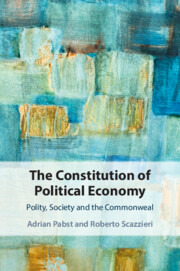Book contents
- The Constitution of Political Economy
- The Constitution of Political Economy
- Copyright page
- Contents
- Tables
- Preface
- Acknowledgements
- Introduction
- Part I Interdependence and the Economic Constitution
- Part II Political Spaces and Policy Actions
- 5 A Political Economy of the Body Politic
- 6 Constellations of Interests and Institutional Architecture
- 7 Policy Actions in an Embedded Polity
- 8 Conclusion
- References
- Name Index
- Subject Index
6 - Constellations of Interests and Institutional Architecture
from Part II - Political Spaces and Policy Actions
Published online by Cambridge University Press: 03 August 2023
- The Constitution of Political Economy
- The Constitution of Political Economy
- Copyright page
- Contents
- Tables
- Preface
- Acknowledgements
- Introduction
- Part I Interdependence and the Economic Constitution
- Part II Political Spaces and Policy Actions
- 5 A Political Economy of the Body Politic
- 6 Constellations of Interests and Institutional Architecture
- 7 Policy Actions in an Embedded Polity
- 8 Conclusion
- References
- Name Index
- Subject Index
Summary
The constitution of a given economy involves features of invariance in the constellations of positions associated with the existing division of labour. The positions of individual or collective actors relative to one another turn a mere collection of actors into a structured body of interdependencies that is already political and economic prior to its formal establishment through a visible settlement. Interdependencies between actors are conducive to plural ways in which interests arise and group affiliations are shaped. This chapter emphasises the distinction between conciliation of interests as compromise between partial interests and conciliation as pursuit of partial interests under a ‘systemic interest’ reflecting the viability of a given body of interdependencies. Institutional architectures are relatively stable systems of formal and informal rules that determine which constellations of affiliations and interests are possible and which ones may be expected for any given pattern of relative positions. There is a two-way relationship between interdependencies and institutional architectures. Alternative patterns of interdependence are associated with different identifications of systemic interest and different patterns of conciliation under that constraint. On the other hand, institutional architectures may trigger interests that may or may not be compatible with existing interdependencies and their transformation over time.
- Type
- Chapter
- Information
- The Constitution of Political EconomyPolity, Society and the Commonweal, pp. 156 - 186Publisher: Cambridge University PressPrint publication year: 2023

